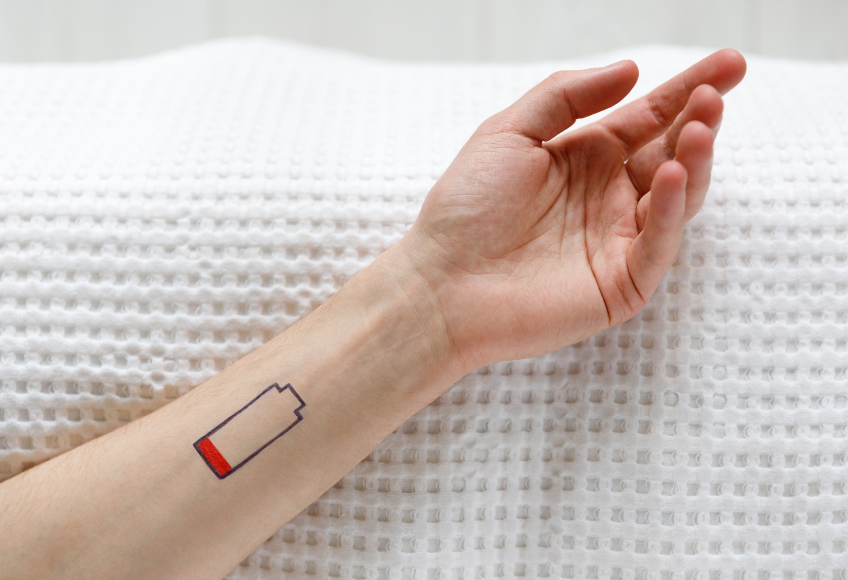
How you can see a lack of nutrients
Julia is sitting in the park on a sunny afternoon. She actually slept well, ate and loves to be in the fresh air - and never feels tired, drained and simply "not quite her". She has the feeling that her hair is brittle than usual and her skin has also become somehow drier. Her histamine intolerance has recently become noticeable, even though she has not eaten anything that contains nothing. Does that also seem familiar to you?
Sometimes there is more than stress or too little sleep. Sometimes your body tells you in this way: "I'm missing something." And this "something" are often nutrients - i.e. vitamins, minerals or proteins that your body needs every day to work well. With us you will find out how you can see a deficiency.
What is a lack of nutrients?
A lack of nutrients means that your body receives too little from one or more important substances - for example through food. These can be vitamins, trace elements, minerals or proteins. The reasons for this are different: some people eat one -sidedly, others avoid certain foods out of conviction or due to intolerance. Even in special phases of life - such as pregnancy, lactation or with a lot of physical and mental stress - your body needs more nutrients than usual. Even with histamine intolerance with severe complaints and symptoms, you do without all kinds of food to alleviate the symptoms. Among them are always foods that contain important vitamins and minerals. For this reason, histamine intolerance often has a lack of nutrients.
Why meditation also makes sense for histamine intolerance
Meditation reduces stress - and less stress means less histamine. In the event of stress, the body releases the hormone cortisol that makes the nervous system on alert. The body activates the combat or escape mode, which means that all the non-survival functions-such as digestion, cell repair and detoxification-pause. The cells no longer absorb nutrients and do not emit waste products, which creates a toxic environment. In addition, neurotransmitters such as adrenaline and norepinephrine are released to sharpen the senses. The immune system is activated, which causes mast cells to release histamine. This continues to keep the body on alert, increase the pulse and widens the blood vessels - which in turn ensures even more stress. Too much histamine in the body also triggers stress. A vicious circle is created. If the body experiences this stress-histamine cycle permanently, the histamine symptoms can deteriorate or add more.
To read on stress and histamine, we already have a detailed contribution for you:
Stress Histamine trigger
How does a lack of nutrients express itself?
There are many possible signs. They often look non -specific at first glance - you feel "somehow not fit". Here are examples of complaints that can indicate an undersupply:
-
1. Persistent fatigue and exhaustion
If you feel tired all the time, even though you sleep enough, an iron deficiency can be behind it. Iron is important for oxygen transport in the blood - if iron is missing, many people feel “burned out”. A lack of vitamin B12 or folic acid can also lead to permanent exhaustion. Women who regularly lose blood due to menstruation are more often affected.
-
2. Hair loss or weak hair
Hair need nutrients to stay healthy. These include, for example, zinc, iron, biotin (also known as vitamin H) and vitamin A. Protein is also crucial - because our hair largely consist of it. If this building blocks are missing, the hair can become thinner, cancel or even turn out more.
-
3. Dry skin and torn mouth angles
If the skin loses clamping power, becomes brittle or cracks arise on the lips, this can indicate a vitamin deficiency. Often the vitamins A, vitamin B2 (riboflavin), vitamin B3 (niacin), vitamin B6 (pyridoxin), vitamin C, vitamin E or vitamin H (biotin) are involved. Zinc, iron and omega-3 fatty acids also play an important role in the renewal of the skin cells. The corners of the mouth in particular are sensitive - there are often defects here.
-
4. Complaints on the tongue
The tongue can provide many indications of your nutrient supply. A burning tongue, visible cracks or an unusually red or pale color can indicate a defect - for example, iron, vitamin B12, vitamin B6, or folic acid. In some cases, a biotin deficiency is the cause.
-
5. Tingling, deafness or "antlauf"
If it tingles in your hands or feet without you bumped out or something was squeezed, there can be a deficiency - for example, vitamin B12 or magnesium. These two nutrients are important for the nerve function. A longer deficiency can have a noticeable effects here.
-
6. Brittle nails or changes in the nail structure
Splintering or soft nails, white spots or visible cross lines can indicate a lack of vitamins or minerals. Biotin, vitamin D, C, iron or zinc are particularly often affected. Calcium and magnesium are also important for strong nails. Striking changes should therefore not only be dismissed as a cosmetic problem.
-
7. Concentration problems and mental exhaustion
If you have difficulty focusing or mentally tired, this can be related to a lack of vitamin D, vitamin B6, B12, magnesium or iron. Fluctuations in blood sugar levels - for example due to too little carbohydrates - can also influence concentration and performance.
-
8. Muscle weakness or fast fatigue
If your muscles tire faster than usual, this can be due to a lack of vitamin D or protein. Magnesium is also important for muscle work. Anyone who is very one -sided or is active in sports should pay attention to a good supply. Older people in particular are more often affected by a lack of protein.
-
9. Warer seeing in the dark
If you can see worse at night while there are no problems during the day, a vitamin A deficiency can be the cause. This is rare in Europe, but possible - especially with very one -sided nutrition. Zinc is also important for the vitamin A metabolism and can be missing in this context.
-
10. Irregular heartbeat or heart stumbling
Magnesium and potassium influence the heart rhythm. If these two minerals are not available in sufficient quantities, there may be extra blows - so -called "heart stolper". These are often harmless, but should be clarified by a doctor, especially with known heart diseases.
-
11. Pale
Not every pale skin means a deficiency. However, if your skin suddenly appears significantly paler than usual, there may be so -called anemia (anemia) - mostly caused by iron deficiency. Folic acid or vitamin B12 deficiency can also be the cause. Most of the time, this goes hand in hand with general exhaustion.
-
12. Frequent infections and weak immune system
If you are sick more often than used to recover from infections, your immune system can need support. This requires many nutrients - including vitamin C, vitamin D, vitamin A, vitamin E and the trace elements zinc, iron and selenium. Good nutrient supply is an important basis for the immune system.
Nutrients in histamine intolerance
If your body cannot reduce too much histamine, this can lead to many symptoms - from headache to rashes to digestive problems. But you can specifically support him:
-
1. Vitamin C - lowers the histamine level
Vitamin C is considered the most important opponent of histamine. Studies show: If the vitamin C level in the blood is low, the histamine value increases significantly. Vitamin C inhibits the release of histamine and supports its dismantling. Buffered vitamin C is particularly recommended - it is well tolerated and ideal for sensitive stomach.
Our dietary supplement Histabalance® Basics already contains buffered vitamin C - combined with other helpful nutrients. -
2. Vitamin B6 - activates the enzyme dao
Vitamin B6 supports many processes in the body, including detoxification in the liver. It is also an important co-factor for the enzyme dao that builds histamine. People with histamine intolerance often have a B6 deficiency-especially after taking the pill or certain medication.
-
3. Zink - supports the immune system and DAO
Zink has a double effect: it inhibits the release of histamine and is also important for the function of the DAO. A deficiency can weaken the immune system and increase the histamine load. Ideally, zinc should be taken in combination with copper to avoid an imbalance.
-
4. Calcium - protects against skin reactions
Calcium can reduce the release of histamine with allergic reactions. It stabilizes the vessels so that less histamine gets into the tissue - and can thus alleviate reddening of the skin or whisper.
-
5. Magnesium - soothes and supports the dismantling
Magnesium is not only important for nerves and muscles - it also plays a role in histamine mining. A deficiency can promote the distribution of histamine and weaken the DAO. Sufficient supply therefore helps twice.
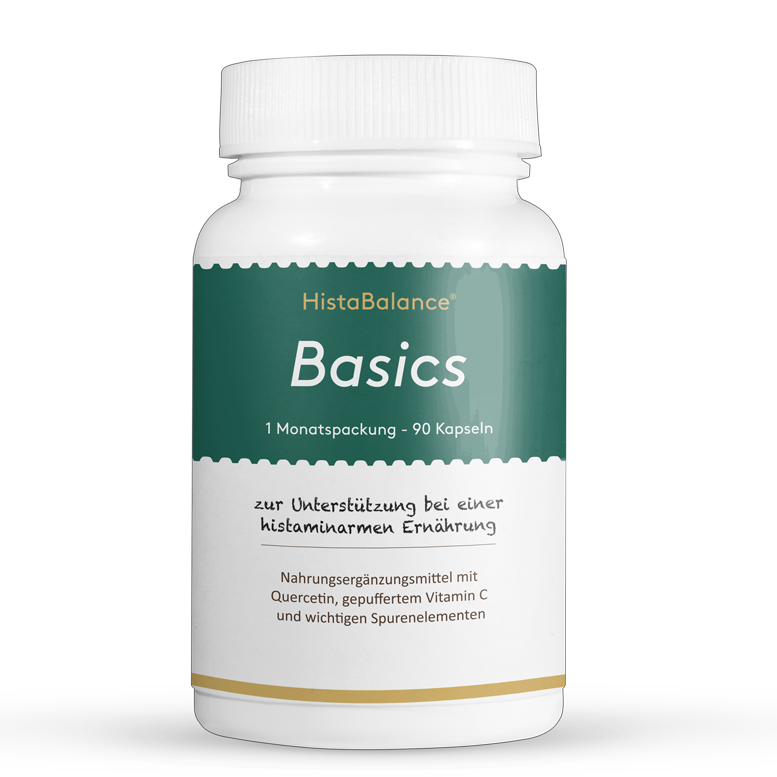
Histaminikus
Basics
4.89 / 5.0
(28) 28 total reviews
Share
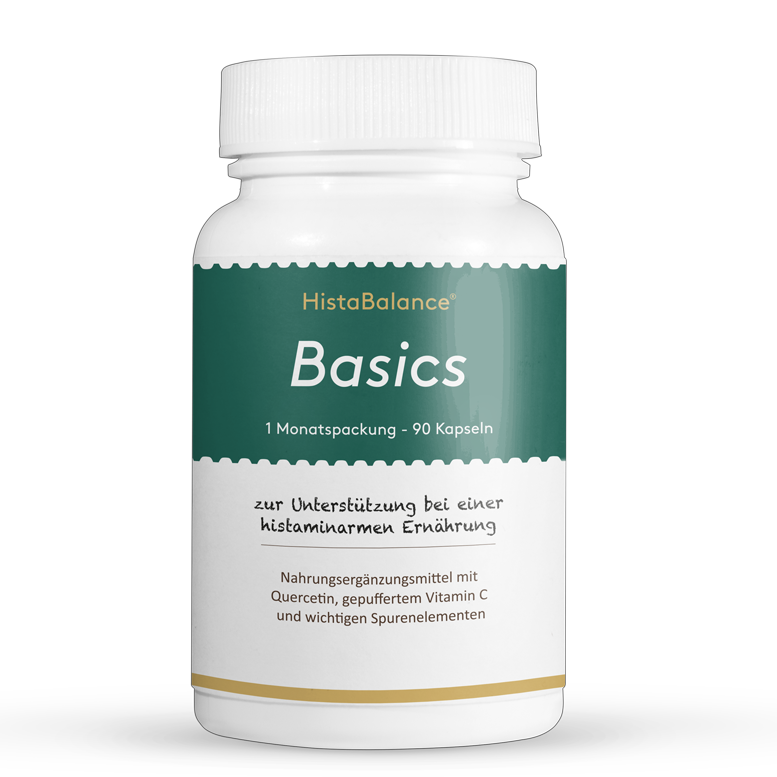
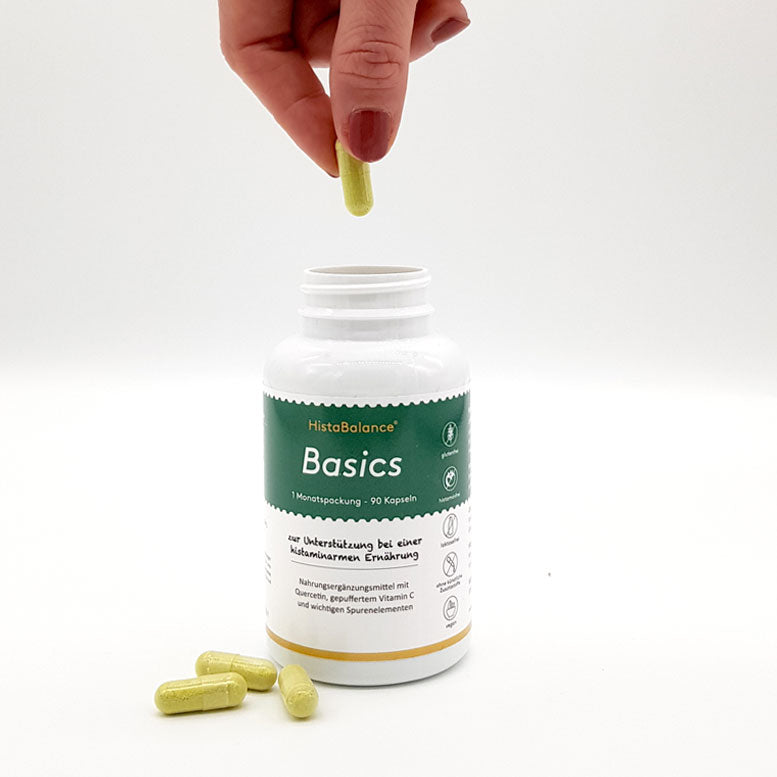





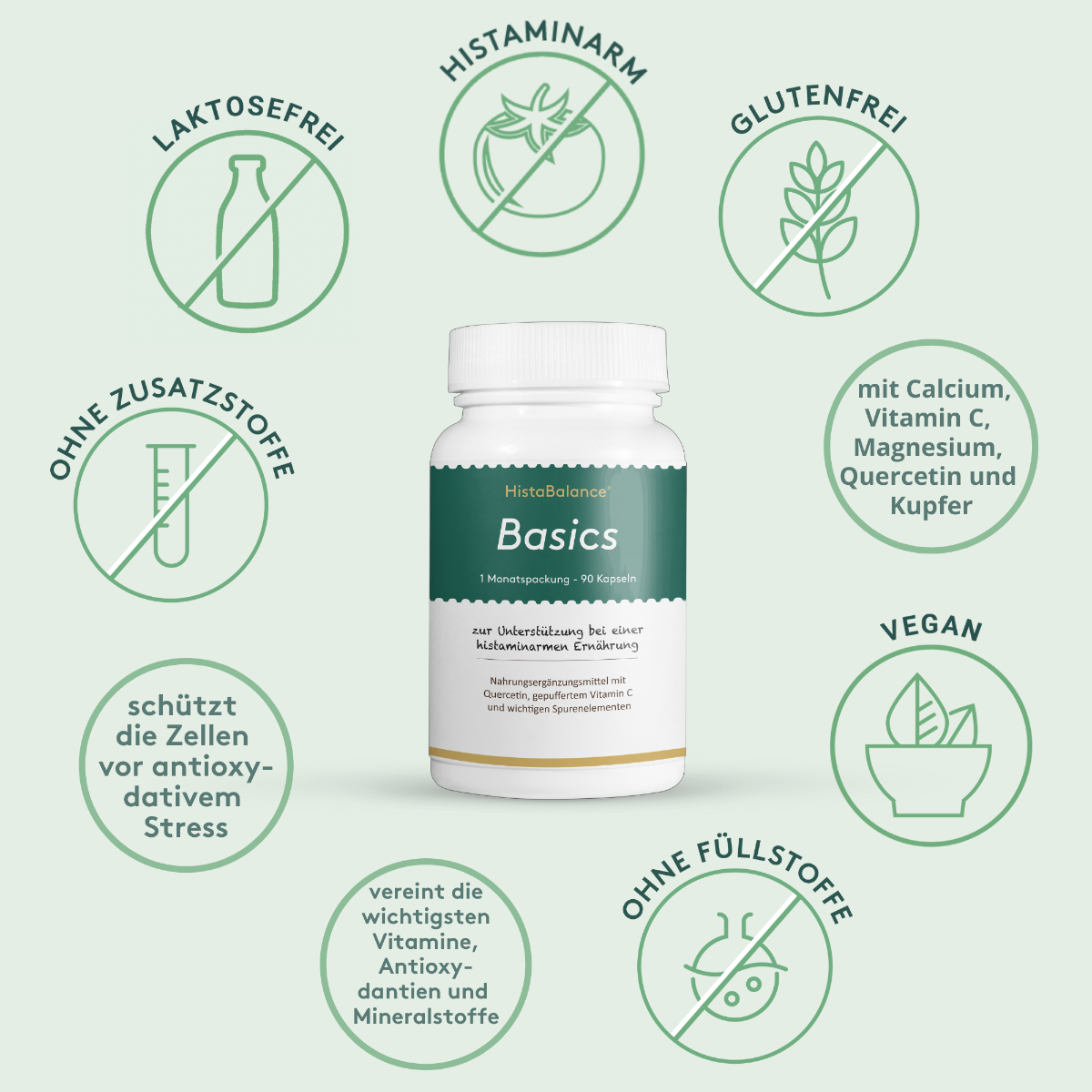

From those affected for those affected
We are Thomas and Michaela Zinser, founder of Histaminikus.
Because of the own histamine intolerance of Michaela and our son, we founded Histaminikus. The frustration does not find any suitable histamine food has spurred us to develop low -histamine food.
We would like to give you back a piece of quality of life. Feel free to look around with us.
Kind regards
Thomas and Michaela






